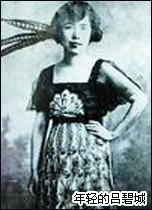Views
Lǚ Bìchéng 呂碧城 (1883-1943)
|
Notable Associates:
|
|
Lǚ Bìchéng 呂碧城 (1883-1943) was probably the most famous Chinese Buddhist woman of the Republican period. She was a poet, journalist, and lay Buddhist. She had extensive experience living abroad in the 1920s and 1930s, and worked to tell Chinese about Buddhism in Europe, and teach Europeans about Buddhist compassion.
Biography
Lǚ's father, Lǚ Fèngqí 呂鳳岐 was a jìnshì 進士 and semi-famous poet. Lǚ was engaged at the age of 9 to a 12 year old, but her parents later backed out of the arrangement and she never married. Her parents wanted her to have a modern education, so they sent her to study at a school run by her uncle.
In 1903, Lǚ went to find a friend in Tiānjīn 天津 and ended up becoming an editor at the Dàgōng bào 大公報 (L'Impartial). She had not been there five months when, in September, she opened and began overseeing a girls’ school. Much of this was was made possible by the help of Yīng Liànzhī 英歛之 and his wife. In 1909, the first class of ten students graduated with teaching degrees. Included in this class was Zhōu Enlái’s 周恩來 future wife.
Lǚ left the school (which changed its name) after the start of the Republic and worked as a secretary in Yuán Shìkǎi’s 袁世凱 administration, but when Yuán declared himself emperor she quit and went to live with her mother in Shànghǎi 上海, where she studied English, read, and invested successfully in trading companies.
After her mother died (in 1918 or 1919), Lǚ planned to go abroad, but first went up to the Běijīing/Tiānjīn area where, in 1920, she heard Dìxián 諦閑 lecturing on the Buddhist sūtras. She took refuge under him at that time. After hearing another lecture by Dìxián and reading some works by Yìnguāng 印光 she took the precepts and became a vegetarian.
In 1920, Lǚ moved to America where she audited literature classes at Columbia University, while serving as a foreign correspondent for the Shanghai Times 上海時報. After a few years she went to Europe, visiting England, Germany, Italy, Switzerland, and other countries. She saw that Europeans and Americans valued material culture, but were not vegetarian and mistreated animals. She also saw the aftermath of World War I. This led her to decide to promote love, non-killing, vegetarianism, and the protection of animals.
In 1932, she published Ōu Měi zhī guāng 歐美之光, a book about vegetarianism, animal protection, and Buddhist studies in the West. She also translated several Buddhist works into English and published bilingual Chinese-English editions of others (such as of the Pǔmén 普門 Chapter of the Lotus Sūtra, which was published by Shanghai Buddhist Books 上海佛學書局 in 1933).
From 1926, she lived in Switzerland, but when World War II broke out, she moved from there to the United States and then Hong Kong. She ended her days in Kowloon 九龍, where she sequestered herself and practiced niànfó 念佛.
Important Works
In Chinese:
- Fànhǎi lǐcè 梵海蠡測
- Guān wúliàng shòu jīng shìlùn 觀無量壽經釋論
- Lǚ Bìchéng jí 呂碧城集
- Mèngyǔ tiānhuá shì cóngshū 夢雨天華室叢書
- Ōu Měi zhī guāng 歐美之光
Bilingual Chinese-English:
- Fǎhuá jīng: Pǔmén pǐn 法華經:普門品
- Xiǎo zhū cí 曉珠詞
References
- Shì Dōngchū 釋東初. Zhōngguó Fójiào jìndài shǐ 中國佛教近代史 (A History of Early Contemporary Chinese Buddhism), in Dōngchū lǎorén quánjí 東初老人全集 (Complete Collection of Old Man Dongchu), vols. 1-2. Taipei: Dongchu, 1974 Pp. 2.632-634.
- Yú Língbō 于凌波. Zhōnguó jìnxiàndài fójiào rénwù zhì 中國近現代佛教人物志 (Biographical Almanac of Early Contemporary and Modern Chinese Buddhism). Beijing: Zongjiao wenhua, 1995. Pp. 505-511.
- Yú Língbō 于凌波, ed. Xiàndài Fójiào rénwù cídiǎn 現代佛教人物辭典 (A Dictionary of Modern Buddhist Persons), 2 vols. Taipei: Foguang, 2004. Pp. 1.403a-406c.
